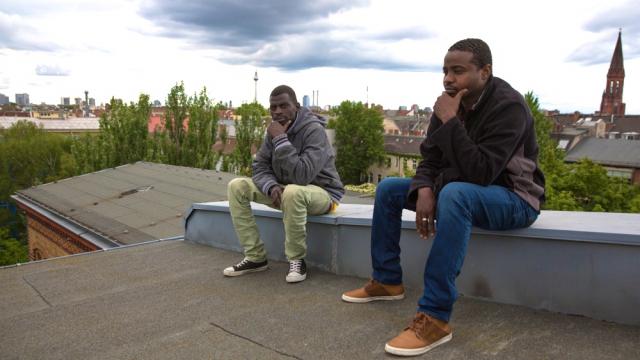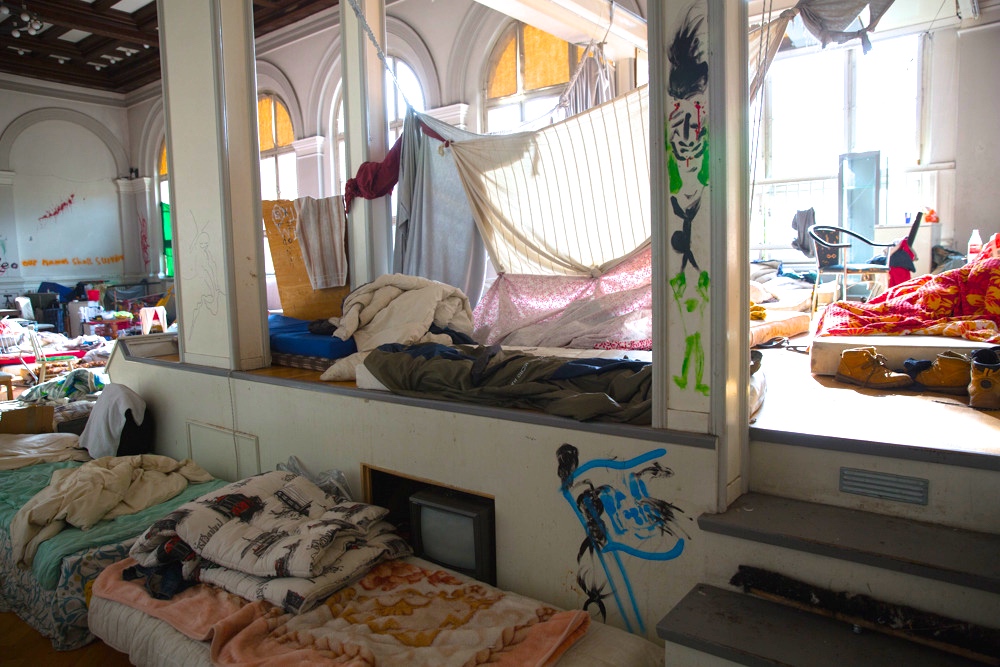
An anti-refugee wave has swept across Berlin as the December opening of six refugee container settlements nears. Facing the worst refugee crisis since the Second World War, a Europe-wide surge to the right, and a riled public squeezed by economic austerity, the "scheming" refugee is Berlin’s new social unifier.
Recently, around 1,000 anti-refugee protesters squared off against counter-protesters in the heart of former East Berlin. Brandishing slogans like “Nein zum Heim” (No to Home), thousands more like them have marched in recent weeks at polarizing "Monday demonstrations." Police personnel in riot gear usually sit tensely between both sides, trying to stave off clashes.
The dispute concerns one of six container shelters that, complete with dorms, shared showers, kitchens and medical examination rooms, could house up to 400 people in centralized sites. Though mobilized by groups like the neo-nazi Freie Kräfte, the demographic of protesters opposing the new €43 million project doesn’t exclusively fit the far-right skinhead stereotype.
With one in three people here now saying they want no more refugees, and one in ten perceiving National Socialism positively, xenophobia is clearly seeping back into Germany’s mainstream.
In the capital specifically, four out of the five districts that the container settlements are destined for – Marzahn, Pankow, Köpenick and Lichtenberg – are in Berlin’s former East, where anti-refugee sentiment simmers strongest, in some cases around 85%. With the influx of refugees to Germany expected to reach 200,000 by the end of this year – a 67% rise since 2012 – and a further 12,000 expected in Berlin alone, authorities say the 2,400 spaces in containers offer a temporary solution to an extraordinary situation.
The Berlin Refugee Council is skeptical of the plan, arguing that there is lots of empty social housing, and around 7,000 uninhabited flats in Berlin that politicians are ignoring. Council spokesperson Martina Mauer sees a racial subtext underlying the government solution.
“The containers stigmatize and degrade the inhabitants,” Mauer says. “They clearly indicate to those living inside them and to outsiders that there is a state of emergency here. The message is crystal clear: whoever lives here is different and doesn’t belong.”
The effect of containers is perpetual social segregation, turning refugees and asylum seekers into problematic settlers on German land. This is incendiary in a time when only 5% of Germans say they have ever been personally acquainted with refugees. So why is this path being taken, and in order to appease whom?
“It eases a genuine fear that people have of losing their identity, who they are, because of immigration," adds Mauer. "That’s why they’re doing this."
According to the Friedrich Ebert Foundation, almost one in two Germans distrust refugees, believing that they fake hardship in order to scrounge benefits from the German state. This preconception is palpable on the placards being waved at anti-refugee demonstrations, which decry "asylum abuse." Yet conversely, it is also German asylum policy that prohibits newcomers from working within their first nine months. And even after those nine months are up, equal access to the market is thwarted as German and E.U. nationals get first dibs on employment.
Bleaker still, welfare assistance for asylum seekers currently comes in the form of vouchers worth 62% of the national unemployment benefit rate. Far from enabling self-sufficiency and personal agency, this system layers on a thick coat of segregation: by making refugees financially unequal to "the rest" of society, by restricting the outlets where refugees may exchange their vouchers for goods, and by limiting the circles in which they may move and integrate socially.
This, Sudanese refugee Adam believes, fuels the world of hand-outs and parallel communities that frightens people. “It’s part of a game that they play to say we are criminals and we are crazy. They play this game to make the public accept our treatment,” he explains.
“If they give us our rights, we’re still young, we’re able to work. We are not people who come here to sleep, to take money. We are not leeches," he says. However, by immediately identifying the bearer’s residential status, welfare coupons force individuals’ entrapment through the burdensome connotation of labels like "refugee" and "asylum seeker."
Yet, with lines like “those who deceive are out,” peddled by Chancellor Angela Merkel’s Bavarian partner party CSU, and the chancellor’s own CDU party flirting with the xenophobic Alternative for Germany (AfD) party, the prevailing Not-In-My-Backyard rationale is unsurprising.
In October, Interior Minister Thomas de Maizière proposed that refugees should be split into two categories: those who come from a "safe" country and those who come from an "unsafe" country. Under de Maizière’s plans, which politicians discussed this week, the process of deportation for those people considered from a "safe" country will be fast-tracked because they will be barred from applying for asylum.
This proposal – to predetermine eligibility based purely on country of origin – puts at risk asylum seekers from West Balkan states, warns the vice chair of Frankfurt human rights organization Pro Asyl, Bernd Mesovic.
“We say Serbia, Macedonia and Bosnia-Herzegovina are not safe! Minorities who are subjected to widespread racist attacks are defenseless in the Balkans. Homosexuals are discriminated against and attacked. Exclusion and discrimination against Roma in the Balkan states are also real and life-threatening,” Mesovic said.
And the trend is not unique to Europe’s economic powerhouse, with last spring's EU elections signalling an upward trajectory for the anti-immigration camp. Like across the continent, the continued rise of Alternative for Germany is triggering a strong reactionary movement in the face of the worst global refugee crisis since 1945.
“Want to help refugees? Invite them into your own homes!” This was the message canvassed by Brandenburg MP Martin Patzelt, of the conservative CDU, in August, to help ease Berlin’s burgeoning refugee crisis. Shifting responsibility for refugees to civilians seemed to have won cross-party consensus by October, when Kreuzberg’s Green Mayor Monika Herrmann called on Berliners to “take the people in”.
The founding of projects like Flüchtlinge Willkommen (Refugees Welcome) and Solizimmer (Solidarity Room), which connects refugees with Berliners who have a spare room to offer, indicates that many in the capital are taking the cue.
Social worker Roberta, 24, is among them. She lives in a shared four-bedroom apartment in Neukölln, and she self-funds one "solidarity room" for a refugee. Roberta and her two flatmates collectively pay the rent, bills and food for the fourth person.
“We wanted to create a stopgap solution so refugees can decide where they live for themselves – away from camps and not on the streets," Roberta says. She says the insights she has gained from teaching German in several refugee camps has spurred her on.
“People from the most different parts of the globe are forced to live in close quarters, under terrible living conditions. These legal requirements lead to social isolation, discrimination and stigma. We wanted to oppose this, even if only on a very small scale.”
Although grassroots movements like these appear to be stepping in where politicians are taking a calculated rain check, they don't free the State of its responsibility. The knock-on effect of officials' willful neglect to address the crisis continues to haunt refugees in Germany. In the first three quarters of 2014, 86 right-wing attacks were reported, which already exceeds the combined number of attacks in 2012 and 2013.
“It is another sign of politics’ failure to take away people’s fear of the ‘stranger’, the ‘other,’” Roberta adds. “If they had educated and clarified, this disgusting right-wing populist and racist propaganda wouldn’t have fallen upon such fruitful ground.”
In the absence of political will to reform Germany’s dysfunctional asylum system, many say an example is being set at the highest level that deems the subhuman handling of refugees as acceptable. Meanwhile, the calls grow for Germany to heed UN warnings of an impending refugee disaster, and to banish rhetoric that not only legitimizes xenophobia but also seeks to shield the country from its own contribution to the crisis.
Pro Asyl is leading appeals to political leaders and civil society to expose this treatment, while also opposing baiting from the right. “If hostile resentment toward refugees isn’t clearly rejected, culprits of racism will continue to be encouraged,” says Mesovic.
3 WAYS TO SHOW YOUR SUPPORT
- Log in to post comments












